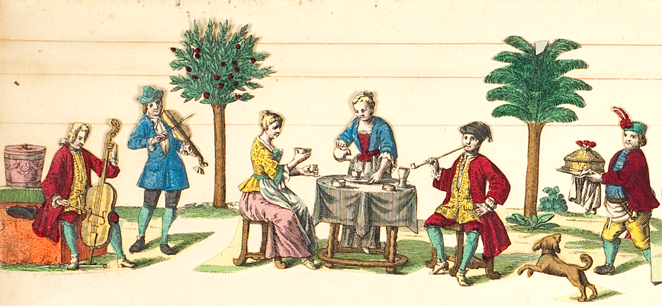Collection context
Summary
- Creator:
- David Shedd Bradley
- Abstract:
- The Bradley mss., 1902-1997 consists of the papers of director and film historian David Shedd Bradley, 1920-1997.
- Extent:
- 138 Boxes
- Language:
- Materials are in English
- Preferred citation:
[Item], Bradley mss., Lilly Library, Indiana University, Bloomington, Indiana.
Background
- Biographical / Historical:
The Bradley, mss., 1902-1997 contains the scripts, correspondence, journals and notebooks, public writings, and audio-visual products of David Shedd Bradley's career as a filmmaker and film historian. Bradley was born in Winnetka, IL, and attended the prestigious Todd School for Boys in Woodstock, IL, arriving a year after the departure of the school's most famous student, Orson Welles. Bradley went on to Northwestern University and served in the Signal Corps in World War II, both times with his friend Charlton Heston.
Before and after the war, Bradley was a pioneer in amateur film-making. He directed the then seventeen-year-old Heston in his first major role, the title character in Peer Gynt (1941). Bradley's directorial credits went on to include: Sredni Vashtar (1943); Macbeth (1947); Julius Caesar (1950), starring Heston again, as Mark Antony; Talk About a Stranger (1952), starring Nancy Davis, and Bradley's only film for a major Hollywood studio (MGM); Dragstrip Riot (1958); 12 to the Moon (1960); and an infamous B-movie, The Madman of Mandoras (1963), rereleased with newly directed footage a few years later as They Saved Hitler's Brain (1968).
Bradley became best known, however, as a film collector and historian. He built an extensive collection that covers the silent film era to 1990s releases. He was a popular film history instructor at a number of colleges and universities, including UCLA. Famous friends and correspondents from this collection include James Agee, Emile Gauguin, and Charlton Heston.
- Scope and Content:
The Bradley mss. consist of the papers of director and film history David Shedd Bradley, 1920-1997. The Film Elements series consists of incomplete films, audio tapes, soundtracks, and replacement footage. Some film elements are currently unavailable. Photographs contain mostly film stills as well as personal photos of David Bradley.
Correspondents include: James Agee; Lindsay Anderson; Kenneth Anger; Thomas Blair; Mr. and Mrs. A. Ballard Bradley; Kenneth Brownlow; Alberto Cavalcanti; Homer Dietmeyer; William Donnachie; Kent D. Eastin; Roy Eggert; William K. Everson; Peter Frank; Jean Gaborit; Emile Gauguin; Grosvenor Glenn; Dwight Green, Jr.; John Griggs; John Hampton; Charlton Heston; Charles Higham; Theodore Huff; Philip Jenkinson; Fritz Lang; Robert E. Lee; Lou Lindsay; Louis McMahon; George Mitchell; Jules Nayfack; Raymond Rohauer; Warren J. Rothenberger; Dore Schary; John Serrano; Marie Seton; Frank Sinatra; George Stevens, Jr.; Preston Sturges; Howard Suber; Charles van Wissinck.
Scripts include screenplay drafts, cast lists, plot synopses, and other production materials for films directed by David Bradley, including Noa Noa, an unproduced motion picture about the life of Paul Gaugin, with an original screenplay by James Agee. Publicity materials include articles, reviews, and flyers for Bradley's work. Business Records contain mainly the financial documentation of Bradley's early films (namely Macbeth) by Mesirow and the Willow Corporation. Course Materials include syllabi, evaluations, and other class-related documents for courses taught by David Bradley at primarily UCLA and Santa Monica College. The Journals and Notebooks series consists primarily of Bradley's production notes for Oliver Twist, Peer Gynt, Macbeth, and Sredni Vashtar. Writings include papers and essays written by David Bradley in high school and college. Biographical materials include a short biography of Bradley's father, A. Ballard Bradley, and David Bradley's original 1975 will that donated his collection to UCLA. The Miscellaneous series includes distribution records of Bradley's films and several scrapbooks.
The full-length films in the collection have been separately and individually catalogued. The titles may be searched through IUCAT, Indiana University Libraries' online catalog.
- Acquisition information:
- Acquired: 2002
- Arrangement:
The collection is organized into the following series: I. Film Elements; II. Photographs; III. Correspondence; IV. Scripts; V. Publicity; VI. Business Records; VII. Pamphlets; VIII. Course Materials; IX. Subject Materials; X. Journals and Notebooks; XI. Writings; XII. Biographical; XIII. Audio-Visual; XIV. Miscellaneous.
- Physical location:
- ALF (Auxiliary Library Facility)
Indexed Terms
- Subjects:
- Motion picture producers and directors --United States.
Motion pictures --Production and direction.
Motion picture film
Motion picture actors and actresses
Film Posters
Epic films
Black and white films
Historical films -- History and criticism
Shakespeare, William, 1564-1616--Film Adaptations - Names:
- Bradley, David, 1920-1997.
Bradley, David, 1920-1997 --Correspondence.
Agee, James, 1909-1955 --Correspondence.
Bradley, A. Ballard --Correspondence.
Brownlow, Kenneth --Correspondence.
Everson, William K. --Correspondence.
Gauguin, Emile --Correspondence.
Jenkinson, Philip, 1935-2012 --Correspondence.
Heston, Charlton --Correspondence.
Higham, Charles, 1931-2012 --Correspondence.
Access
- RESTRICTIONS:
-
This collection is open for research.
Many collections are housed offsite; retrieval requires advance notice. Please make an appointment a minimum of one week in advance of your visit.
- TERMS OF ACCESS:
-
Photography and digitization may be restricted for some collections. Copyright restrictions may apply. Before publishing, researchers are responsible for securing permission from all applicable rights holders, then filling out the Permission to Publish form.
- PREFERRED CITATION:
-
[Item], Bradley mss., Lilly Library, Indiana University, Bloomington, Indiana.
- CAMPUS:
- Indiana University Bloomington
- LOCATION OF THIS COLLECTION:
-
1200 East Seventh StreetBloomington, Indiana 47405-5500, USA
- CAMPUS:
- Indiana University Bloomington
- CONTACT:
-
(812) 855-2452liblilly@indiana.edu

